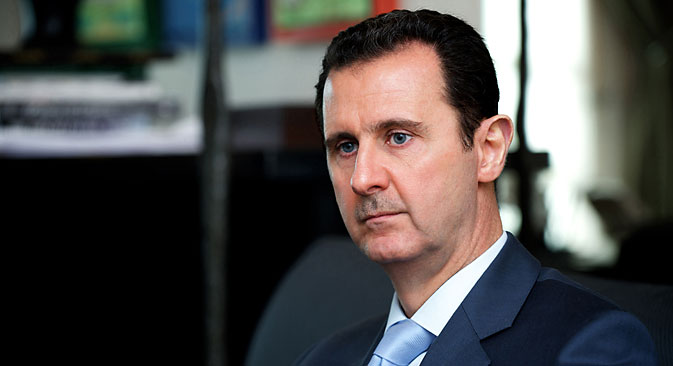
Syrian President Bashar al-Assad. Source: AFP/East News
All factions – both the government and illegal armed units who fought against the government – should unite to struggle against terrorism. And we see that happening: certain groups that were previously opposed to the Syrian government are now on our side, fighting against terrorists.
This country supports the Syrian government politically, economically and militarily. The ‘military support’ here does not imply what some Western media are trying to present as the deployment of Iranian forces in Syria. This is not true. Tehran is supplying us with military equipment. Granted, an exchange of military experts between Syrian and Iran does take place, but we have consistently carried out such exchanges in the past. It is natural that bilateral cooperation of this kind would intensify during wartime. And, yes, the assistance coming from Iran is the key factor contributing to the resilience of Syria during this barbaric conflict.
As we all know, arms, money and volunteers are supplied to the al-Nusra Front and ISIS by Turkey, which maintains close relations with the West. Recep Tayyip Erdogan or Ahmet Davutoglu can’t make a single decision without the consent of the United States and other Western countries. Both the al-Nusra Front and ISIS owe their rise in the region to support from the West. The West sees terrorism as a trump card up its sleeve that it can exploit from time to time. Currently, the West wants to use the al-Nusra Front against ISIS, probably because ISIS went out of control in a sense. But this does not mean they want to destroy ISIS. If they really wanted to, they would have done it.
The roots of the crisis lie in the war that led to the sectarian division of Iraq, which had had a partial impact on the situation in Syria and had made it simpler to foment inter-confessional conflicts within the country.
The second, less important turning point was the official support the West provided in the early 1980s to Afghani terrorists, retooled as “freedom fighters.” Later, when ISIS emerged in 2006 due to the efforts of the U.S., Washington did nothing to stop this group. All these factors taken together served to create the conditions for unrest, which was supported by the West and financed by the Gulf States, particularly Qatar and Saudi Arabia, with logistical assistance provided by Turkey.
Interview unabridged (in Russian)
All rights reserved by Rossiyskaya Gazeta.
Subscribe
to our newsletter!
Get the week's best stories straight to your inbox